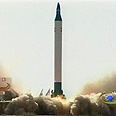
The US Air Force's National Air and Space Intelligence Center, in a new report, says Iran, with support from outside sources, within six years could produce an ocean-leaping missile capable of hitting the United States.
"Iran has ambitious ballistic missile and space launch development programs and, with sufficient foreign assistance, Iran could develop and test an ICBM capable of reaching the United States by 2015," the report released Thursday said.
The report, made available by the Federation of American Scientists, said North Korea's Taepodong 2 missile also could be developed as an intercontinental ballistic missile that could put the United States in range and said the weapon "could be exported to other countries in the future."
The Obama administration has asked Congress for $7.8 billion for missile defense in fiscal 2010, down about $1.2 billion from 2009. Congress is considering adding more funds.
Joining forces with North Korea
Meanwhile Thursday, the head of the Pentagon's Missile Defense Agency said that Iran and North Korea have worked together and made significant progress on ballistic missiles that could carry deadly warheads.
"It really is an international effort going on out there to develop ballistic missile capability between these countries," Army Lieutenant General Patrick O'Reilly told a forum on Capitol Hill.
Iran and North Korea each are at odds with their neighbors and with much of the international community over nuclear programs. Each has demonstrated a capability to launch missiles that fired through their second stages this spring.
They represent the most pronounced example of a kind of international "coalition" sharing know-how on avionics, propulsion and materials among other things, O'Reilly said.
"We've seen it for years and it continues," he said of such cooperation between North Korea and Iran.
Their ability to fire missiles with a stable ignition and launch a second stage represents "a significant step forward" for both of them, O'Reilly said.
Asked which was further along in missile development, he said it could be described as a "horse race" with no clear leader.















